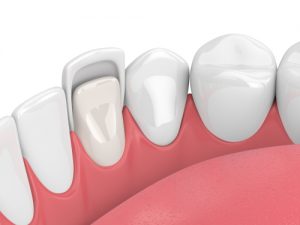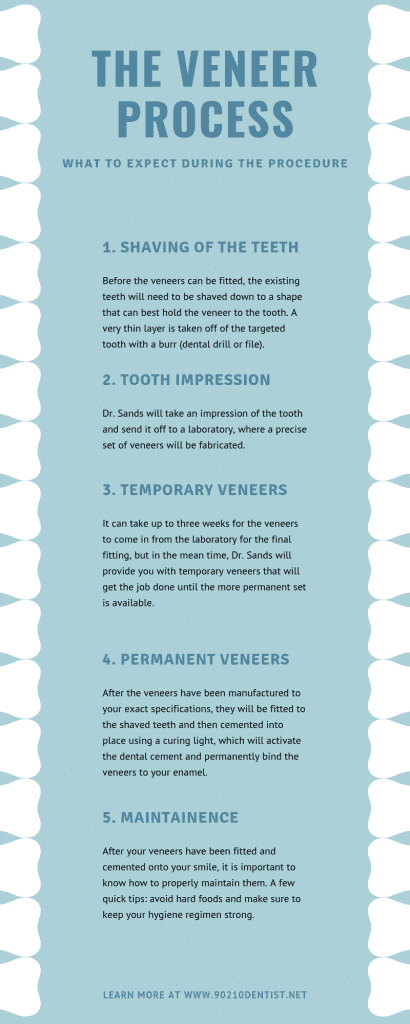Veneers are one of the most versatile options to help restore a smile that is suffering from cracked, chipped, crooked, stained, or gapped front teeth. They are as durable as regular teeth and are even resistant to staining that would normally yellow natural tooth enamel.

There are a lot of factors to consider when you are thinking about veneers. Some people aren’t sure how to maintain them, while others are wondering if they are even strong candidates to have them fitted. No matter what your question is, Dr. Kevin B. Sands wants to ensure that you are as educated as possible when it comes to making dental decisions.
What Are Veneers?
Veneers are custom-made, thin shields of ceramic (porcelain) or composite resin material that are placed and bonded to the front surface of a tooth to improve the aesthetics or protect against surface damage to the tooth. They may be placed on one or more teeth.

Should I Get Veneers?
If you have a tooth that is damaged, decayed, or dilapidated in any way, you are likely a strong candidate for veneers. After your consultation, Dr. Sands will decide if you are a good candidate for veneers. If you are, then you will both discuss your aesthetic goals and find a dental plan that works best for you.
During the consultation, it is imperative that the ideal veneer length is determined, since veneers that are too long can cause speech problems and discomfort and veneers that are too short can also function improperly and have obvious aesthetic issues.
How Are Veneers Attached?
A dental technician typically makes veneers in a dental lab, working from a model provided by a dentist. The entire procedure can take place in as little as two appointments.
- Before the veneers are designed, the front surface of the teeth will need to be reshaped by shaving off a very thin layer using a burr (a dental drill or file). The amount that is removed is minimal and equivalent to the thickness of the veneer.
- Next, an impression of the teeth is taken and sent off to the dental laboratory to cast an accurate model of the teeth, which is used to fabricate the veneers. Although this process may take up to three weeks for the final fitting, patients may be provided with temporary veneers to protect the prepared teeth.
- Once the veneers are designed, they will be fitted to the prepared teeth and cemented into place. A curing light is used to activate the dental cement so that it permanently bonds the veneers to the teeth.

How Long Do Veneers Last?
Veneers are essentially permanent; they are designed to last between 10 and 15 years before they are replaced by another set. While the veneers can be swapped out, it is important to keep in mind that the process is irreversible, since the teeth will be shaved down to accommodate the veneers.
The secret to veneer longevity is proper maintenance, care, and taking the appropriate precautions. Here is a list of tips to help you keep your new smile from breaking down prematurely:
Avoid Hard Foods
Just like regular teeth, chewing on hard items like pens or using your teeth as tools can potentially damage your veneers. Cracking or chipping them is rare, but it is possible. Habitually chewing in the same spot or using certain teeth to open packages consistently can also wear them out over time. Ice and hard candy should also be eaten in moderation and infrequently to avoid potential damage. This is true for natural teeth as well.
Maintain Healthy Dental Hygiene
Veneers can collect plaque and tartar build-up exactly the same way natural teeth do, which is why it is so important to keep up with your dental hygiene. Brush your teeth twice a day, floss daily, and be sure to keep your biannual dental cleaning appointments.
Only a dental hygienist can remove tartar from your teeth, which is almost guaranteed to build up over time. Keeping your cleaning appointments will prevent worse problems, such as gingivitis and cavities.
Eat Whatever You Want
With your veneers, you can enjoy virtually any food. Wine, coffee, blueberries, and other food and beverages that can stain your teeth will have no effect on porcelain veneers.
How Much Do Veneers Cost?
The cost of dental veneers will vary for many reasons, including the:
- Dentist you choose
- Number of teeth involved (number of veneers to be placed)
- Material used (porcelain or composite resin)
- Cost of any procedure(s) that may need to be done beforehand
Dr. Sands will provide you with an accurate estimate during your consultation.
If you are ready to schedule a consultation or would like more information about veneers, please give our office a call at (310) 273-0111.